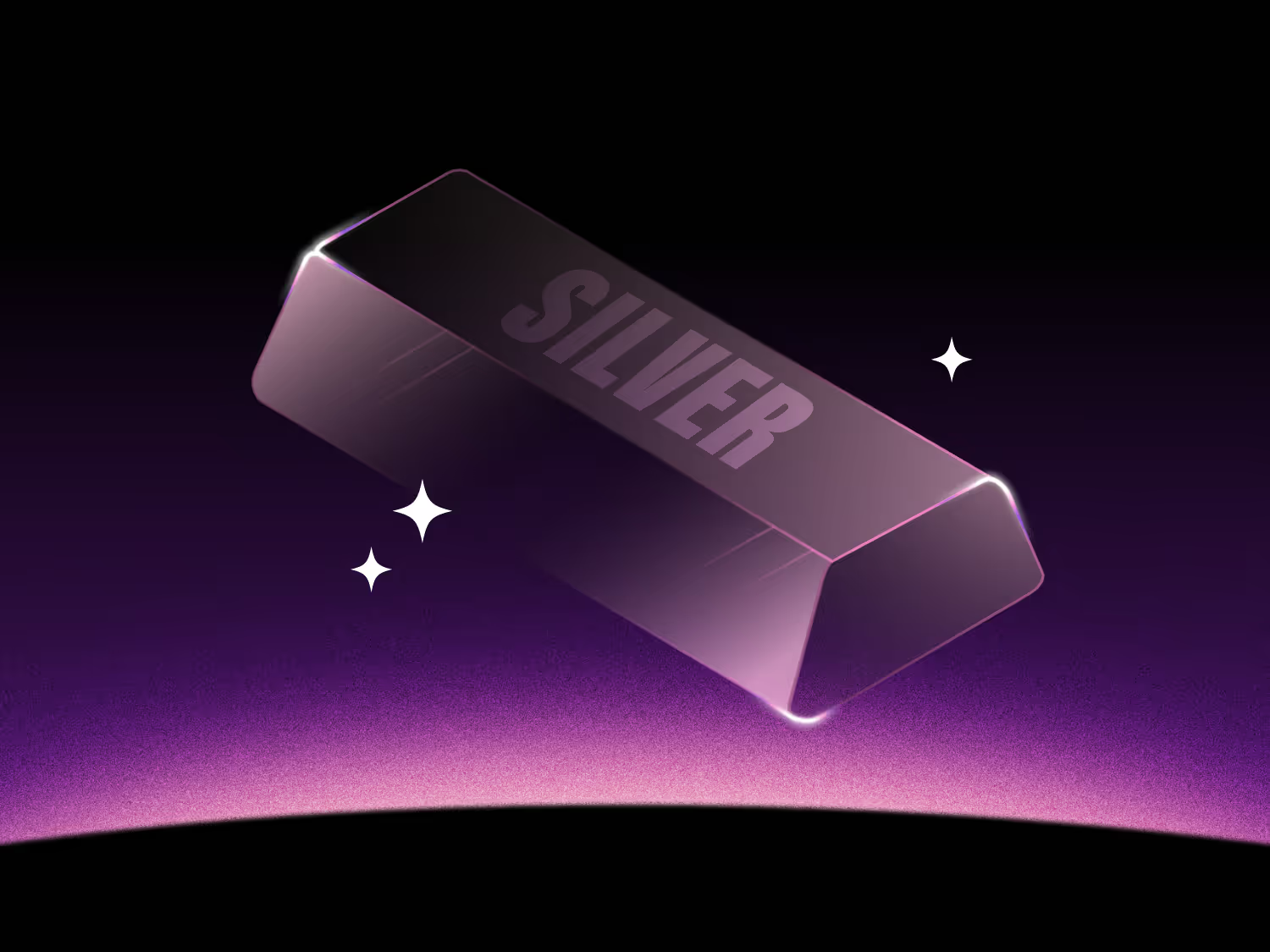Is silver a good investment?
When it comes to precious metals, gold is usually dubbed the star of the show. But what about silver? Is it a good investment? While often overshadowed by gold, silver has its merits too. It’s often seen as a hedge against inflation, and it’s a key input for a growing list of electronic products. That duality gives it some distinctive market characteristics which might make it worthy of a coveted spot in your diverse portfolio.
Is now a good time to buy silver?
Silver prices are up over the last year, though they’re very far from their all time high in the 1980s. That's not necessarily a reason to avoid investing. It's just one way that this precious metal varies from gold, which has more or less seen its price increase over time.
While ongoing inflation concerns and geopolitical uncertainty have historically bolstered demand for silver, its price is also heavily dependent on changes in consumption patterns for a wide range of products.
Because of that, silver's price movements are often much more volatile than gold’s. This can come with opportunities and challenges. If you have a long-term investing mindset though, then those daily ebbs and flows aren’t so important.
Silver investment options
UK investors have several avenues for gaining exposure to silver, each with its own unique flavour:
1. Physical silver
Owning tangible silver coins or bars gives direct exposure to the asset. However, investing in physical silver requires that you have somewhere to store it. That’s a lot easier in theory than practice. Silver is also subject to a 20% value-added tax (VAT) in the UK, unlike gold. It also cannot be held in your ISA or SIPP, meaning you’ll lose out on meaningful tax advantages.
2. Silver ETCs
Exchange-traded commodities (ETCs) are a more convenient way to get exposure to the price of a commodity without having to buy the physical asset. iShares Physical Silver ETC (SSLN) and WisdomTree’s Core Physical Silver Accumulating ETC (WSLV) are two ways to tap into silver with Freetrade. Both investments can also be held within an ISA or SIPP, meaning any potential investment gains and dividends will be tax-free.
3. Silver mining stocks
You can also invest in silver miners to gain exposure to the precious metal. Usually, miners are involved in multiple commodities rather than strictly silver. For instance, Fresnillo (FRES) is one of the world’s biggest silver producers. It also produces gold, lead, and zinc. This has both pros and cons: on one hand, it supports diversification so that you’re not relying on silver alone. But it can also make it harder to predict a given miner’s success.
4. Options
Silver options are basically contracts to buy or sell silver at a future date. They usually offer significant leverage, meaning they carry a substantial risk of capital loss. They cannot be held within tax-advantaged accounts like ISAs or SIPPs, making them unsuitable for most retail investors.
Should I invest in silver?
As with any investment, there are potential benefits and risks associated with holding silver in your portfolio. Those will also largely depend on how you’re investing in the metal. Generally speaking, there are a few key things to keep in mind before deciding to invest in this commodity.
Let’s start with demand. Silver is mostly used for electricals and electronics. It’s also a vital component in green technologies like electric vehicle batteries and solar panels. Gold doesn’t have nearly as many use cases as silver, which is why the latter is much more sensitive to changes in economic conditions than gold. This can be a benefit or a drawback to silver, depending on how you look at it. When economies are booming, demand tends to grow for silver. Of course, on the flip side, the price and demand for silver can fall when the market is struggling.
Silver is typically more volatile than gold. Its price can fluctuate two to three times more in a single day, according to Morgan Stanley. Because of this, it’s wise to take a long-term view on your investment. Be prepared to hold any investments for at least five years to weather the market’s ups and downs. And while silver's lower price point compared to gold can make it more accessible, with fractional shares you can invest in a part of a mining stock or ETC with just a few pounds anyway.
The silver investment outlook for 2025
Silver continues to benefit from strong industrial demand, thanks to its status as the metal with the greatest electrical conductivity. That makes silver an ideal choice for building high-end electronics. And over the past few years, technologies like AI and 5G have driven demand for electronics requiring silver components.
At the same time, US President Trump has doused the markets with uncertainty as his tariff threats remain unpredictable. This could weaken industrial demand, which could ultimately decrease demand for silver too.
On the other hand, silver is seen as a safe-haven asset. With Goldman Sachs forecasting a 30% chance of a US recession this year, silver could see renewed investor interest if markets turn risk-averse.
Keep in mind that none of this is investment advice, and you should always do your own research before making investment decisions.
How to invest in silver
Investing in a silver ETC or silver miner is the same as investing in any other ETF, stock, or trust.
Here’s how to get started with Freetrade
When you invest, your capital is at risk. The value of your investments can go down as well as up and you may get back less than you invest.
Freetrade does not give investment advice and you are responsible for making your own investment decisions. If you are unsure about what is right for you, you should seek independent advice.
ISA and SIPP eligibility rules apply. Tax treatment depends on your personal circumstances and current rules may change.
A SIPP is a pension designed for you to save until your retirement and is for people who want to make their own investment decisions. You can normally only draw your pension from age 55 (57 from 2028), except in special circumstances.
At present, Freetrade only supports Uncrystallised Fund Pension Lump Sums (UFPLS) for customers who wish to withdraw funds from their SIPP after their 55th birthday. We strongly encourage you to seek financial advice before making any withdrawals from your SIPP.




.avif)



.jpg)



